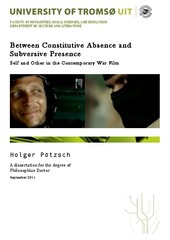Between constitutive absence and subversive presence : self and other in the Contemporary War Film.
Permanent lenke
https://hdl.handle.net/10037/4103Åpne
Thesis introduction (PDF)
Holger Pötzsch: 'Borders, barriers, and grievable lives : the discursive production of self and other in film and other audio-visual media”, Nordicom Review (2011), vol. 32, issue 2, pp. 75-94. (PDF)
Dato
2012-04-19Type
Doctoral thesisDoktorgradsavhandling
Forfatter
Pötzsch, HolgerSammendrag
Through the combination of a discourse-theoretical framework and advances in cognitive film theory, this dissertation aims at conceptualizing the ways through which film and other audio-visual media impact on the spectator and on political discourse.
In close readings of a variety of contemporary war films and games, I describe the formal representational conventions through which the genre frames the perception of self, other, and the nature of their conflict. I argue that war films and games establish, maintain, and reinforce epistemological barriers that render stability to a hegemonic discursive identity – the soldier-self – and that frame the respective opponent as ubiquitously absent – inaccessible, incomprehensible, yet potentially omnipresent as a deadly threat. Audience identification is systematically directed toward the soldier-self and allegiance is invited to only this side. Deployed across various audio-visual media epistemological barriers acquire the function of interpretative schemata that tacitly predispose audience engagements not only with diegetic, but also with potential or actual real world opponents. The ubiquitously absent enemy becomes a floating signifier in political discourse that various competing articulations struggle to fix in particular objectified configurations.
I then proceed to show how liminality subverts epistemological barriers and reconstitutes them as inherently connective zones of contact and negotiation. With reference to close readings of war films that subtly challenge the conventions of the genre, I argue that border-crossing characters and shared locations enable a resurfacing of the identity and discourse of the previously confined other. This way liminality dislodges mutually exclusive war identities and brings into view nonviolent alternatives to a politics of polarity and exclusion.
Beskrivelse
Papers number 1, 2 and 4 of this thesis are not available in Munin:
1. Holger Pötzsch: 'Challenging the border as barrier : liminality in Terrence Malick’s The Thin Red Line', Journal of Borderlands Studies (2010), Vol. 25, issue 1. Available at http://journals.uvic.ca/index.php/borderlands/article/view/2113
2. Holger Pötzsch: 'Liminale Räume in Srdjan Dragojevićs ‚Lepa Sela, Lepa Gore’ und Danis Tanovićs ‚Ničija Zemlja’', part of Kulturanalyse im zentraleuropäischen Kontext (2011) (eds. Wolfgang Müller-Funk et.al.) Available: Library catalogue or Publisher's site
4. Holger Pötzsch: 'Framing narratives : opening sequences in contemporary American and British war films', accepted manuscript version. Later published in Media, War & Conflict, August 2012 vol. 5 no. 2 155-173, available at http://dx.doi.org/10.1177/1750635212440918.
1. Holger Pötzsch: 'Challenging the border as barrier : liminality in Terrence Malick’s The Thin Red Line', Journal of Borderlands Studies (2010), Vol. 25, issue 1. Available at http://journals.uvic.ca/index.php/borderlands/article/view/2113
2. Holger Pötzsch: 'Liminale Räume in Srdjan Dragojevićs ‚Lepa Sela, Lepa Gore’ und Danis Tanovićs ‚Ničija Zemlja’', part of Kulturanalyse im zentraleuropäischen Kontext (2011) (eds. Wolfgang Müller-Funk et.al.) Available: Library catalogue or Publisher's site
4. Holger Pötzsch: 'Framing narratives : opening sequences in contemporary American and British war films', accepted manuscript version. Later published in Media, War & Conflict, August 2012 vol. 5 no. 2 155-173, available at http://dx.doi.org/10.1177/1750635212440918.
Forlag
Universitetet i TromsøUniversity of Tromsø
Metadata
Vis full innførselSamlinger
Copyright 2012 The Author(s)
Følgende lisensfil er knyttet til denne innførselen:


 English
English norsk
norsk
